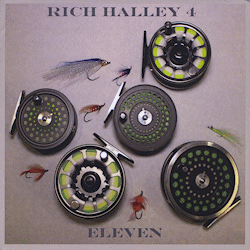Reification Suite: Retroactive; Radioactive; Remnant
The Dugite Strikes
The Creep of Time
Glimpses through the Fog
Adjusting the throughput
Dead of Winter
Convolution
Slider
The Animas
Rich Halley (tenor sax): Michael Vlatkovich (trombone): Clyde Reed (bass): Carson Halley (drums)
Recorded May 2014, Jackpot Recording Studio, Portland, Oregon [60:23]
Saxophonist Rich Halley leads his quartet in a Portland-recorded set of which the Reification Suite is the first item on the list. A three-part
suite it showcases the band’s angular boppish style, with Michael Vlatkovich’s nasal-toned trombone adding a strongly personalised presence to the
front-line, along with a very noticeable quotation from a famous bop anthem. The tenor-trombone-bass-drums line-up is both stripped back and also mobile,
the suite’s central movement having a funkier vibe and its finale largely featuring the front line in unison over an insistent bass-led introduction.
Rather thrashier and urgently scurrying material makes itself evident in The Dugite Strikes whilst there’s a ballad-lite feel toThe Creep of Time with its cautious, slow quality. Each of these tunes has a strong character, and that’s no less true of Glimpses through the Fog which starts with that angular quality already noted in Halley’s playing augmented by Vlatkovich’s throbbing trombone.
Carson Halley enjoys a moment of drum thrash here, whilst the leader’s squealing sax prepares one for a major explosion of free wailing – except that the
music instead turns deftly toward an attractive slow section, something of a quasi-andante along Blue Note lines. The band’s more circumscribed and best
qualities - tone, ensemble theme, development – can be enjoyed in Dead of Winter.
This post-Bop band seems somewhat fixated on the length of bar-lines involved in each piece – read Rich Halley’s brief descriptions in the gatefold to read
whether you’re listening to a 38 bar composition or a 37 one, for instance. There are times listening to the disc that I felt that more attention could
have been paid to the music-making’s humanity and rather less to the length of bar lines.
Jonathan Woolf
